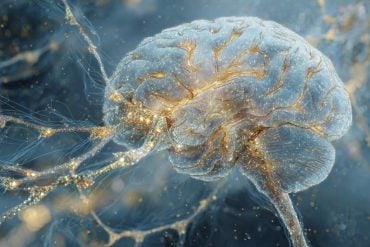Summary: Researchers have discovered how stress disrupts memory specificity, leading to generalized aversive memories—a hallmark of PTSD. Stress increases endocannabinoid release, enlarging memory engrams in the brain, which triggers fearful responses to unrelated, safe situations.
Blocking endocannabinoid receptors on specific interneurons restored memory precision in preclinical models, offering hope for PTSD treatment. These findings shed light on the biological underpinnings of stress-induced memory generalization and open pathways for therapeutic intervention.
Key Facts:
- Stress enlarges memory engrams, creating generalized fearful memories.
- Endocannabinoid overproduction disrupts interneurons that constrain engram size.
- Blocking endocannabinoid receptors restored memory specificity in PTSD models.
Source: Hospital for Sick Children
Researchers at The Hospital for Sick Children (SickKids) have uncovered that stress changes how our brain encodes and retrieves aversive memories, and discovered a promising new way to restore appropriate memory specificity in people with post-traumatic stress disorder (PTSD).
If you stumble during a presentation, you might feel stressed the next time you have to present because your brain associates your next presentation with that one poor and aversive experience. This type of stress is tied to one memory.

But stress from traumatic events like violence or generalized anxiety disorder can spread far beyond the original event, known as stress-induced aversive memory generalization, where fireworks or car backfires can trigger seemingly unrelated fearful memories and derail your entire day. In the case of PTSD, it can cause much greater negative consequences.
In a study published in Cell, Drs. Sheena Josselyn and Paul Frankland, Senior Scientists in the Neurosciences & Mental Health program, identify the biological processes behind stress-induced aversive memory generalization and highlight an intervention which could help restore appropriate memory specificity for people with PTSD.
“A little bit of stress is good, it’s what gets you up in the morning when your alarm goes off, but too much stress can be debilitating,” says Josselyn, who holds a Canada Research Chair in Circuit Basis of Memory.
“We know that people with PTSD show fearful responses to safe situations or environments, and have found a way to limit this fearful response to specific situations and potentially reduce the harmful effects of PTSD.”
Together with their colleague Dr. Matthew Hill at the University of Calgary Hotchkiss Brain Institute, the research team was able to block endocannabinoid receptors on interneurons, and limit stress-induced aversive memory generalization to the specific, appropriate memory.
Stress-induced memory generalization
In a preclinical model, the research team exposed subjects to an acute, but safe, stress before an aversive event to create a non-specific fearful memory that could be triggered by unrelated safe situations, similar to how PTSD presents in humans.
The team then examined the subject’s memory engrams, which are physical representations of a memory in the brain pioneered by the Josselyn and Frankland labs at SickKids.
Usually, engrams are made up of a sparse number of neurons, but the stress-induced memory engrams involved significantly more neurons. These larger engrams produced generalized fearful memories that were retrieved even in safe situations.
When they looked closer at these large engrams, the study found that stress caused an increase in the release of endocannabinoids (endogenous cannabinoids) which disrupted the function of interneurons, whose role is it to constrain the size of the engram.
Memory and the endocannabinoid system
The endocannabinoid system enhances memory formation and helps link lived experiences with specific behavioural outcomes.
In the amygdala, the emotional processing centre of the brain, certain ‘gate keeper’ interneurons have special receptors for endocannabinoids, and help constrain the size of the engram and the specificity of the memory.
But, when too many endocannabinoids are released, the function of the gatekeeping interneurons is disrupted, causing an increase in the size of the engram.
“Endocannabinoid receptors function like a velvet rope at an exclusive club. When stress induces the release of too many endocannabinoids, the velvet rope falls, causing more generalized aversive fearful memories to form,” explains Josselyn.
“By blocking these endocannabinoid receptors just on these specific interneurons, we could essentially prevent one of the most debilitating symptoms of PTSD.”
A surprising link between stress and the developing brain
In 2023, previous research in Science identified larger, more generalized memory engrams in the developing brain than in the adult brain, just like stress-induced memory engrams.
As they continue to explore this unexpected link between engram size, stress and age, the teams are also delving into how daily stressors may impact happy memories.
“The many biological functions and processes that make up the complexity of human memory are still being uncovered,” says Frankland, who holds a Canada Research Chair in Cognitive Neurobiology.
“We hope that as we better understand human memory, we can inform real-world therapies for those with various psychiatric and other brain disorders throughout their lifespan.”
Funding: This research was funded by the Canadian Institutes of Health Research (CIHR), the Natural Sciences and Engineering Research Council of Canada (NSERC), the Dutch Research Council, Niels Stensen Fellowship, ZonMw Memorabel, Alzheimer Nederland, Toronto Cannabis and Cannabinoid Research Consortium and Brain Canada Foundation.
About this stress and memory research news
Author: Jelena Djurkic
Source: Hospital for Sick Children
Contact: Jelena Djurkic – Hospital for Sick Children
Image: The image is credited to Neuroscience News
Original Research: Open access.
“Stress disrupts engram ensembles in lateral amygdala to generalize threat memory in mice” by Sheena Josselyn et al. Cell
Abstract
Stress disrupts engram ensembles in lateral amygdala to generalize threat memory in mice
Stress induces aversive memory overgeneralization, a hallmark of many psychiatric disorders. Memories are encoded by a sparse ensemble of neurons active during an event (an engram ensemble).
We examined the molecular and circuit processes mediating stress-induced threat memory overgeneralization in mice.
Stress, acting via corticosterone, increased the density of engram ensembles supporting a threat memory in lateral amygdala, and this engram ensemble was reactivated by both specific and non-specific retrieval cues (generalized threat memory).
Furthermore, we identified a critical role for endocannabinoids, acting retrogradely on parvalbumin-positive (PV+) lateral amygdala interneurons in the formation of a less-sparse engram and memory generalization induced by stress.
Glucocorticoid receptor antagonists, endocannabinoid synthesis inhibitors, increasing PV+ neuronal activity, and knocking down cannabinoid receptors in lateral amygdala PV+ neurons restored threat memory specificity and a sparse engram in stressed mice.
These findings offer insights into stress-induced memory alterations, providing potential therapeutic avenues for stress-related disorders.






